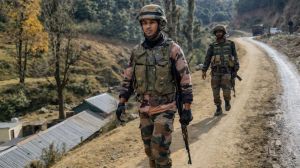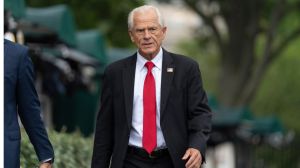A time for Choosing
THE president of Iran, Mahmoud Ahmadinejad, may or may not settle for a nuclear compromise with the United States, which is being brokered b...

THE president of Iran, Mahmoud Ahmadinejad, may or may not settle for a nuclear compromise with the United States, which is being brokered by Russia and Europe. But the Indian communists demand that India diminish itself into a clapper boy for Tehran in its nuclear confrontation with the world.
Ever since India voted with the European resolution on Iran at the International Atomic Energy Agency in September, the CPIM, led by its general secretary, Prakash Karat, has demanded a reversal of the Indian position when Iran8217;s nuclear proliferation comes up for fresh debate in Vienna later this month.
Despite the intense domestic pressure from the Left on Iran, the UPA government is enjoying a rare diplomatic leverage in both Washington and Tehran. For the first time in years India has acquired a major say on an important international security question.
Prime Minister Manmohan Singh would hardly want to squander this rare moment.
IN surprising the world, and angering the communist parties, with its vote at the IAEA board of governors on September 24, India gained at least three big advantages.
It largely undercut those in Washington arguing against the Bush administration8217;s historic decision on July 18 to launch civilian nuclear energy cooperation with India after a gap of nearly three decades.
The Indian vote at the IAEA significantly increased the chances of the US Congress supporting the necessary changes in American domestic law to facilitate nuclear trade with India.
Three, while Karat wants a predictable, non-aligned response from India on Iran, Manmohan has discovered that by breaking away from the non-aligned group, India has a lot more room for independent diplomatic play.
If unpredictability always provides space, India chose to reinforce it by an explanation of its vote that expanded its options through some clever ambiguity.
India has hinted it might reconsider its vote if there was an American rush to condemn Iran and hang it in the United Nations Security Council. India was also keeping its options to judge how the nuclear pact with the US was going to be implemented.
WHAT about the losses from the vote, which surely shocked the Iranians? Won8217;t Tehran threaten to undercut the wide range of energy and political cooperation with New Delhi?
To be sure, there were dark hints from the Iranians on the eve of the September vote that it might cut off energy cooperation with India. But as the word got out, the Iranians were quick to deny it and reassure India that all was well.
The threat was never serious, because Iran needs all the support it can from large nations like India; and not merely in the IAEA. Iran has few friends in the world and it needs India as a partner to break out of its economic and political isolation. In any case, Iran was in no position to deny itself the petroleum linkages with India, one of the world8217;s largest energy consumers.
As the Iranian nuclear issue comes up for reconsideration at the IAEA on November 24, the value of India8217;s vote has already gone up. Since September 24, the composition of the IAEA board of governors has changed, adversely from the US point of view. Some of the new members 8212; like Cuba and Libya 8212; might make it even tougher for the US.
BUT don8217;t for a moment believe that Karat and Manmohan are acting in tandem. The Left has never been known for its astuteness in judging global developments. The Indian communists have a long tradition of misreading the complexities of the world and substituting them with simplistic slogans. Instead of fretting over the Iranian vote, the government has sensed a rare moment that must be seized. When India is poised to break out of its longstanding isolation in the nuclear and other high technology sectors, the Iran debate is a god-sent opportunity.
For Karat, who harks back to the comforts of a knee-jerk anti-Western foreign policy, Iran itself is rather irrelevant. What bothers the Left is not the Iranian proliferation as much as the expanding Indo-US relationship.
While the left would want the government to regain the old habit of opposing the US on every issue, the challenge before Manmohan is very different. For him it is not choosing sides on the basis of ideology, but of weighing competing interests in both Iran and the US and developing a policy that protects India8217;s interests.
Manmohan, as anyone else in Delhi, is deeply conscious of the geopolitical significance of Iran and the importance of deepening engagement with it. After all it was Manmohan who decided, in September 2004, that India must support the Iranian proposal for a natural gas pipeline.
His decision came in the face of intense opposition from the security establishment that was dead set against any pipeline that came through Pakistan. The Left was hardly interested in the pipeline, until, of course, the US expressed its opposition to it.
It was also Manmohan who negotiated the unprecedented civilian nuclear energy cooperation with President George W. Bush in July at the White House. Having struggled for such a deal for so many decades, no Indian prime minister would want to throw this away for anything else. It is in this context that India has had to deal with the US-Iran confrontation on Tehran8217;s proliferation.
UNLIKE Karat, who has given a clean chit to Iran8217;s nuclear ambitions, the government is burdened by far too much information, current and historical, on Iran8217;s missile and nuclear programmes and its links with many other nations, including China and Pakistan. Even Israel was Iran8217;s partner on a missile programme when the Shah of Iran was reigning in Tehran, until the late 1970s.
Nor could India ignore the fact that Iran was caught hiding an enrichment programme for 18 years until it was discovered a few years ago. If Iran8217;s programme was entirely for peaceful purposes, why did it not choose to declare it? This question might be inconvenient for the Left, but there is no way the Indian state can ignore it.
While the Left would like to present the Iranian nuclear proliferation as a case of imperialism versus the third world, the more pertinent question for India has always been: is a nuclear Iran in India8217;s interests?
Once India answered this question for itself, which Manmohan did well before the IAEA vote in September, the rest was mere diplomatic detail.
On the eve of the voting, India repeatedly said it was against further proliferation of weapons of mass destruction in its neighbourhood and that Iran must abide by its legal obligations under the Nuclear Non-Proliferation Treaty.
ONCE it defined these broad positions, there was no question of supporting Iran on its nuclear hide-and-seek with the IAEA and its three European interlocutors 8212; Britain, France and Germany.
India8217;s choice on September 24 had also become easier once the adventurists in Tehran, led by the new Iranian president, replaced the moderate regime of Mohammad Khatami and chose nuclear confrontation instead of dialogue.
While the communist parties seem to believe that the blunder-prone Ahmadinejad regime must be supported even at the cost of India8217;s own interests, there has been an intensive debate in Tehran once the Iranians discovered on September 24 that, barring Venezuela, no country was willing to back it.
Moderate voices in Tehran, including former president Hashemi Rafsanjani, are calling for a more measured nuclear policy. A brutal assessment would suggest that Ahmadinejad cannot afford a confrontation, whatever his current posturing might be.
An equally candid analysis would reveal a badly weakened President Bush cannot walk into yet another war in Iran. As a result India is well-positioned to craft out a positive role for itself in the current crisis.
INDIA has reasons to be pleased that its emphasis on diplomatic solutions has gained traction as harsh realities induce some flexibility in both Tehran and Washington. While Russia has taken the lead on finding ways to end the nuclear crisis, India is not uninvolved in the current diplomatic efforts.
It is by engaging all sides, by finding a reasonable balance between the principle of non-proliferation and giving a face saver for Iran to walk back from the precipice that India stands to defend its interests in both Washington and Tehran. That precisely is what Manmohan Singh is doing, while Karat raises the noise levels in Lucknow, and elsewhere.
- 01
- 02
- 03
- 04
- 05































